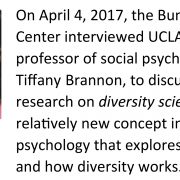Under what conditions can diversity related courses succeed in fostering academic and social benefits? An Interview with UCLA Professor, Tiffany Brannon
On April 4, 2017, the Bunche Center interviewed UCLA professor of social psychology, Tiffany Brannon, to discuss her research on diversity science, a relatively new concept in psychology that explores when and how diversity works. She examines diversity initiatives that target historically underrepresented groups (e.g., ethnic minorities, first-generation college students, women in STEM fields) that have a positive social impact on both minorities and non-minorities.
When asked about her most interesting research project, she spoke about a study that influences psychology, diversity and the real world. Brannon wanted to see if people who are not among the historically disadvantaged would improve their attitudes and behaviors towards minority groups by taking a class on diversity; and whether a minority student’s sense of belonging would improve through this course. This study was influenced by recent diversity course requirements at colleges and universities throughout the country, including UCLA’s College of Letters and Sciences. The larger aim of the study is to understand under what conditions or ‘when’ and ‘how’ diversity related courses might succeed in fostering academic and social benefits.
Why Diversity Matters
When people lack the opportunity to have meaningful interactions with someone who differs from them socially, culturally and or ethnically, their behavior is shaped by stereotypes molded by the media. For example, if a non-black male has minimal interaction with other black males, he or she may rely on media portrayals of black males – representations that are more likely to be negative such as mugshots of black males on the news; thus, allowing black more than white individuals to be associated with criminal. By providing more diversity, which includes more women in the STEM field and more black students in a university, one acquires more diverse perspectives and higher interest in multicultural groups and more positive intergroup attitudes.
The Project
For this study, Brannon created a simulation diversity class called the “UCLA Centennial Study” (UCLA is a few years away from its centennial). 140 participants were randomly assigned to either write about a time when they felt connected to UCLA (the experimental condition) or about their commute to UCLA (the control condition). Students in the experimental condition read an excerpt from Borderlands/ La Frontera, by Gloria Anzaldua. The book is about US – Mexico borders and is written in Spanish on one side and English on the other. Students who read the book were advised to write a journal entry, essay or poem about it. Subjects then filled out identity measures and described themselves in different situations (i.e., with friends, family, and at UCLA). She examined overlapping circles to analyze how integrated people felt within different contexts. Subjects then took an implicit association test (IAT) to measure how quickly they made an association of something positive and negative about different racial groups (e.g., blacks, whites, Asians, and Latinos). Brannon investigated whether becoming immersed in the Latin-American culture by reading this book affected their attitudes toward multicultural groups. The participants’ interest was partially measured by how many raffle tickets they filled out to win a copy of the book. By reading a book about the Latin-American experience and deeply engaging with the content, students showed more positive associations of and interest in historically underrepresented groups. Brannon also found that students in the experimental condition (even for those who were not part of a historically underrepresented group), felt more socially connected to UCLA, and everyone in the social connection study to UCLA reported more overlap in their various identities.
Takeaways
Brannon hopes that at an institutional level, universities will show a real commitment to diversity classes so they are not marginalized. This is core to the experience of being a UCLA student, speaks volumes about how much value the university places on diversity, and enhances healthier, more positive associations of diverse groups.

